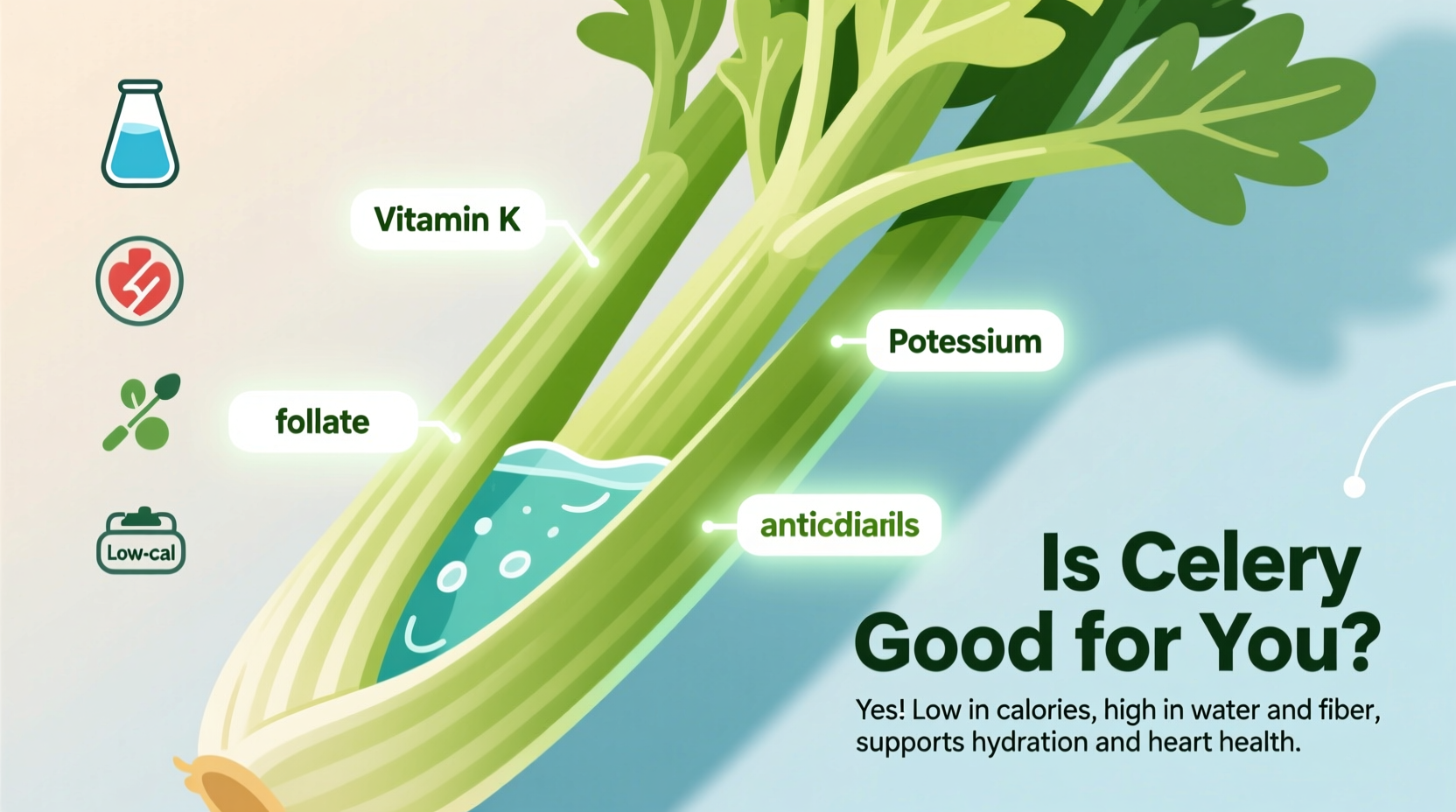The Nutritional Reality of Celery: More Than Just Water
When evaluating "is celery good for you," we must look beyond its reputation as a "negative calorie" food. Celery's nutritional profile reveals why this humble vegetable deserves a place in balanced diets. While 95% water content makes it excellent for hydration, the remaining 5% packs surprising nutritional value.
| Nutrient | Per Cup (101g) | % Daily Value | Compared to Cucumber |
|---|---|---|---|
| Calories | 16 | 1% | Similar |
| Vitamin K | 32mcg | 27% | 3x higher |
| Potassium | 260mg | 7% | 2x higher |
| Vitamin A | 453IU | 9% | 10x higher |
| Sodium | 80mg | 3% | 5x higher |
Data source: USDA FoodData Central
Science-Backed Health Benefits You Should Know
Research confirms several evidence-based benefits of regular celery consumption. The National Institutes of Health notes that celery contains luteolin, an antioxidant that may reduce inflammation. This makes celery particularly valuable for those managing chronic inflammatory conditions.
For hydration-focused diets, celery outperforms many fruits and vegetables. Its natural electrolyte balance—particularly potassium content—makes it more effective for rehydration than plain water. Registered dietitians often recommend celery with lunch because its fiber content (1.6g per cup) promotes steady digestion without causing bloating.

Understanding Celery's Limitations: Context Matters
While "is celery good for you" generally yields positive answers, certain contexts require caution. The sodium content, though moderate in absolute terms, is relatively high compared to other vegetables. For individuals on strict sodium-restricted diets (under 1,500mg daily), consuming more than 2 cups of celery could contribute significantly to their limit.
Celery ranks #12 on the Environmental Working Group's 2024 Dirty Dozen list, meaning it typically carries higher pesticide residues than many produce items. Choosing organic celery reduces exposure to these chemicals, especially important for pregnant women and children.
Additionally, some medications interact with compounds in celery. Blood thinners like warfarin may require dosage adjustments when celery consumption changes significantly due to its vitamin K content. Always consult your healthcare provider about dietary changes if you're managing health conditions.
Maximizing Celery's Benefits: Practical Usage Guide
To get the most from celery in your diet, focus on preparation methods that preserve nutrients. The leaves contain significantly more nutrients than the stalks—up to 300% more vitamin K and twice the calcium. Chop and use the entire plant rather than discarding the greens.
For optimal antioxidant absorption, pair celery with healthy fats. Try:
- Celery sticks with almond butter instead of peanut butter
- Sautéed celery in olive oil for soups and stews
- Blended celery smoothies with avocado
The ideal daily amount for most adults is 1-2 cups chopped. This provides substantial nutrients without excessive sodium intake. For those specifically seeking anti-inflammatory benefits, consuming celery regularly over 8-12 weeks shows more significant effects than occasional use according to clinical nutrition studies.
Frequently Asked Questions
Does celery actually have negative calories?
No, the "negative calorie" concept is a myth. While celery is extremely low-calorie (16 calories per cup), your body uses about 5-10 calories digesting it. The net gain is still positive, though minimal. This makes it excellent for weight management but not calorie-negative.
Can celery help lower blood pressure?
Research suggests celery may support healthy blood pressure due to its potassium content and phthalides, compounds that relax blood vessels. A 2022 review in the Journal of Medicinal Food found regular celery consumption correlated with modest reductions in systolic blood pressure, though it shouldn't replace prescribed hypertension treatments.
Is celery juice as beneficial as whole celery?
Juicing removes celery's valuable fiber, which aids digestion and blood sugar control. While juice provides concentrated vitamins, you lose the physical benefits of chewing and the full spectrum of nutrients. Whole celery offers more balanced nutrition and longer-lasting satiety compared to juice.
How should I store celery to maintain freshness and nutrients?
Wrap celery tightly in aluminum foil and store in the refrigerator crisper drawer. This method maintains crispness for 3-4 weeks by allowing ethylene gas to escape. Avoid plastic bags, which trap moisture and accelerate spoilage. For maximum nutrient retention, use within 2 weeks of purchase.











 浙公网安备
33010002000092号
浙公网安备
33010002000092号 浙B2-20120091-4
浙B2-20120091-4